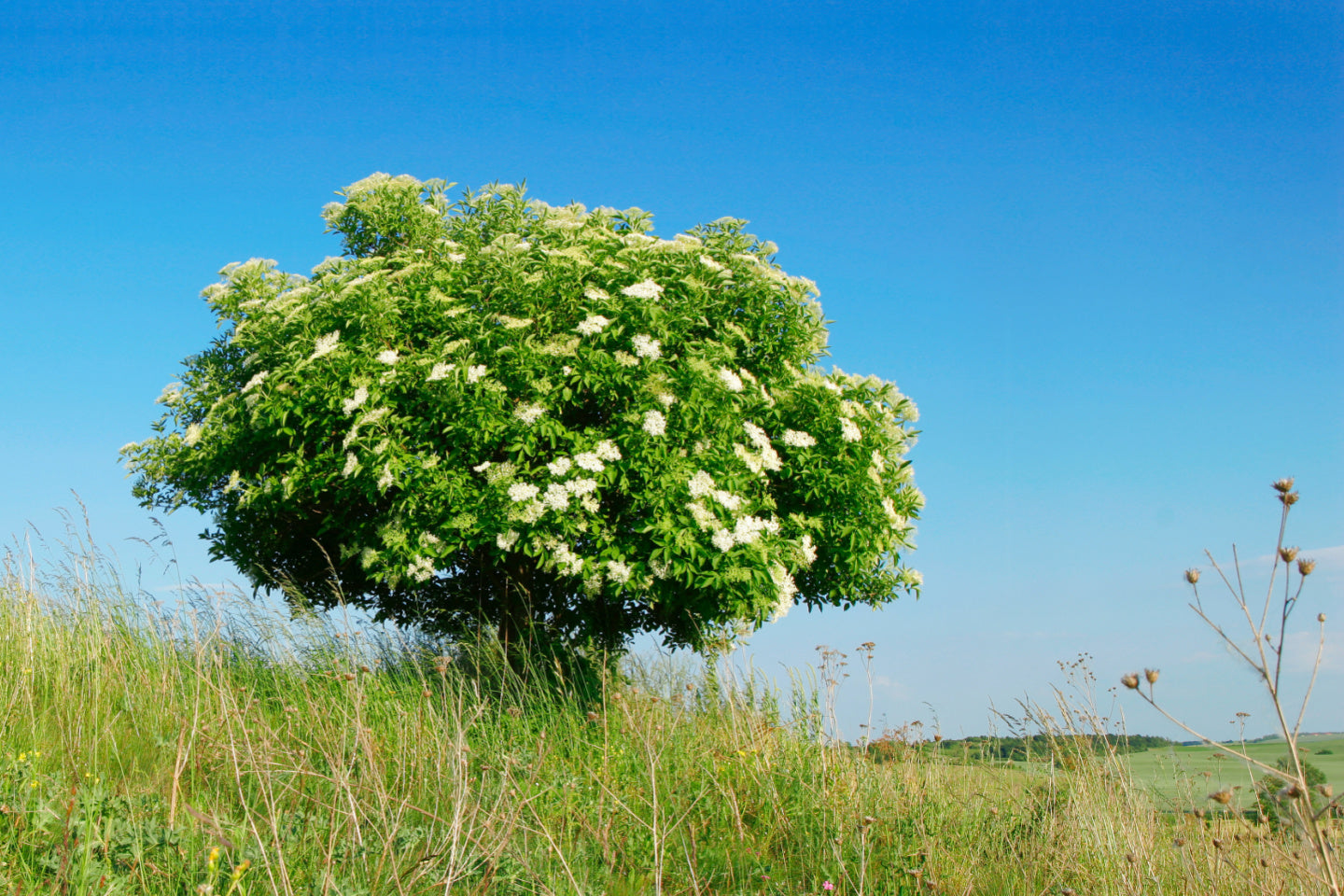Elderberry Folklore: A Case for Sustainability

By Ian Spohn, ND
By now you've probably already heard of elderberry, but have you heard of the Elder Mother? According to legend, the elder tree (Sambucus nigra) from which elderberries derive is inhabited by a notorious fairy spirit known as the Elder Mother, whose easily offended and spiteful nature was the origin of many taboos. In particular, it was widely discouraged and in some places actually legally forbidden to chop down the tree for firewood, as this would enrage the Elder Mother and unleash catastrophic curses, such as pestilence and lightning strikes. The spirit thought to inhabit the tree was so widely feared that it was once common practice to formally thank the Elder Mother before taking anything whatsoever from her tree, including its berries, in an effort to appease her and escape her curse. It was said this could range in severity from her rendering the berries you picked ineffective, to being forever haunted by her malicious spirit.
The health benefits of Sambucus nigra have been known and highly praised for centuries, its use possibly prehistoric (flints shaped like elder leaves have been found in ancient burials). So appropriating parts of the tree for human use is hardly a recent phenomenon. In times past, it was not uncommon for rhymes to be solemnly recited before taking anything from the tree, as a sign of respect to the Elder Mother and as a charm to allay her notorious vengeance. While exact wording varies depending on the source, the basic gist of these rhymes would always be: if you let me take some of your tree as a medicine, I promise that my body will grow into a tree after I'm buried. Some esoteric herbalists recognize the Elder Mother as a tutelary spirit, whose presence helps to instruct and promote the virtues of other medicinal plants, consistent with the image of a wise but somewhat stern and persnickety old woman, who demands the respect of those she would help and becomes most embittered toward people who selfishly take from the forest without giving back. She was apparently petty enough to switch people's newborn babies with fairy changelings, should they dare to construct their child's crib out of elder wood without thanking her first.
It is safe to say that herbalism has come a long way since those days of yore, and yet ironically, the thankless exploitation of earth's resources is arguably a more pressing issue now than it was when people feared to be cursed by fairies for doing so. We no longer live in an age of superstition, but instead expect herbal products to provide evidence-based benefits backed by scientific research. From the dark, twisted forest that has become the natural products industry, where the quest to find a genuine and effective herbal supplement is fraught with peril, modern science has helped to distinguish what actually works from so many faithless will-o-wisps whose enchanting claims might otherwise lead astray. Herbalism in general has undoubtedly benefited from scientific research: investigative studies help to identify active constituents, advanced botanical extraction techniques allow these extracts to become more concentrated, and clinical research helps to translate ancient remedies for concerns such as dropsy and ague into solutions for modern health issues facing us today.
But while fully acknowledging the benefits of advancement and progress, it is also important not to disdain and forget the wisdom of the past. True progress cannot be a relentless drive towards any single ideal – if so, cancer and consumer capitalism could be considered among the highest forms of achievement. Rather, true progress seems to require a simultaneous movement in opposite directions. While ascendance is important to growth, true growth also requires a simultaneous downward motion, as though back to one's roots, a reconnection to source. We can see this represented in nature, for example, geneticists have found that our DNA strands run antiparallel: one running ascending, the other descending. To truly make progress and evolve, we must learn to advance both forwards and backwards at the same time.
Elderberry has been used for a very long time – it is said that Charlemagne's plan to provide his empire with universal healthcare included a mandate for elder trees to be planted in every monastery – but the plant's rich history and folk reputation is not what accounts for its modern popularity. Elderberry is also one of the most extensively researched herbal remedies, particularly for its benefits to respiratory and immune health, and its modern popularity can really be traced to some key studies done back in the early 2000s. In the modern landscape of evidence-based medicine and science-backed dietary supplements, wherein folk wisdom no longer suffices and demands are made to identify active constituents, elucidate mechanisms of action, and verify traditional claims, elderberry has achieved and maintained its popularity on the sheer strength of the modern research behind it, not the shrouded mythology surrounding it, however charming those tales might be.
But generations of acquired folk wisdom should not be easily discounted, any more than modern scientific evidence should be ignored. Herbal supplements are unique and wonderful in that they allow us to reap novel health benefits emerging from the latest scientific research while simultaneously allowing us to reconnect to humanity's ancestral roots. Everyone is beginning to sense that the modern, conventional approach to western healing, drawn as it is from a purely materialistic and outdated Cartesian view of the universe, is finally beginning to give way to more enlightened models. In this way, herbal remedies backed by science represent the future, but like the polarity true progress entails, they also represent a return to the wisdom of the past. When we use herbs to improve our health and lives, is it really acceptable or advisable to wholly ignore the ancient folk practices and surrounding them, such as thanking the Elder Mother before using her elderberries? Are we certain we truly know as much about the world as we like to think we do?
Whether or not the Elder Mother is real, and whether or not she must be appeased for elderberry products to be safely used, it can never be a bad thing to practice gratitude and give back to nature, whether this be done with spiritual intention or purely out of a pragmatic and at the moment, well-justified concern for our planet. And just in case the legendary Elder Mother does turn out to be real, you may rest assured that she won't curse you for buying a Bold Botanica elderberry product. Because in addition to getting the boldest elderberry available, in the form of a 65X concentrated extract, your purchase will also be supporting Bold Botanica's one-tree-planted mission: for every bottle sold, we plant a tree on your behalf. That should please the Elder Mother, if she truly exists, for as a tutelary spirit of the forest said to watch over other medicinal plants, to give back to the woods in some way in exchange for taking her berries is the best way to thank her. And even if she isn't real, that tree planted will still do its part to recycle carbon dioxide into life-giving oxygen, contributing to make the modernized world that much greener, along scientific principles.

Ian Spohn, ND, is a staff naturopathic doctor on the Bold Botanica Team who enjoys challenging the dogmas of both conventional and alternative medicine. He is a passionate supporter of the paleo diet and classical homeopathy.
This blog is intended for educational purposes only. This information has not been evaluated by the Food and Drug Administration. This information is not intended to diagnose, treat, cure, or prevent any disease.



